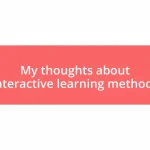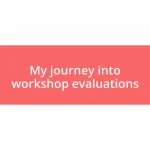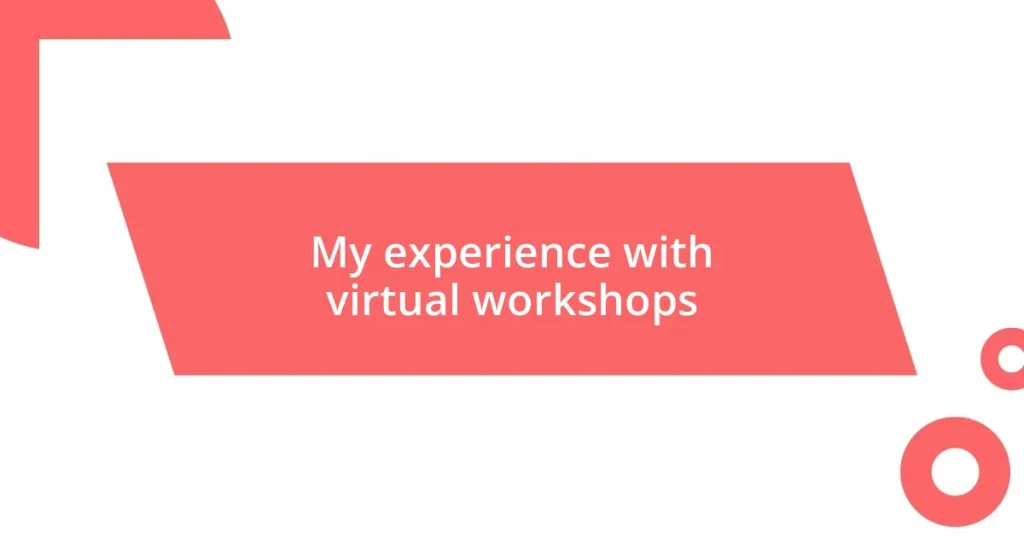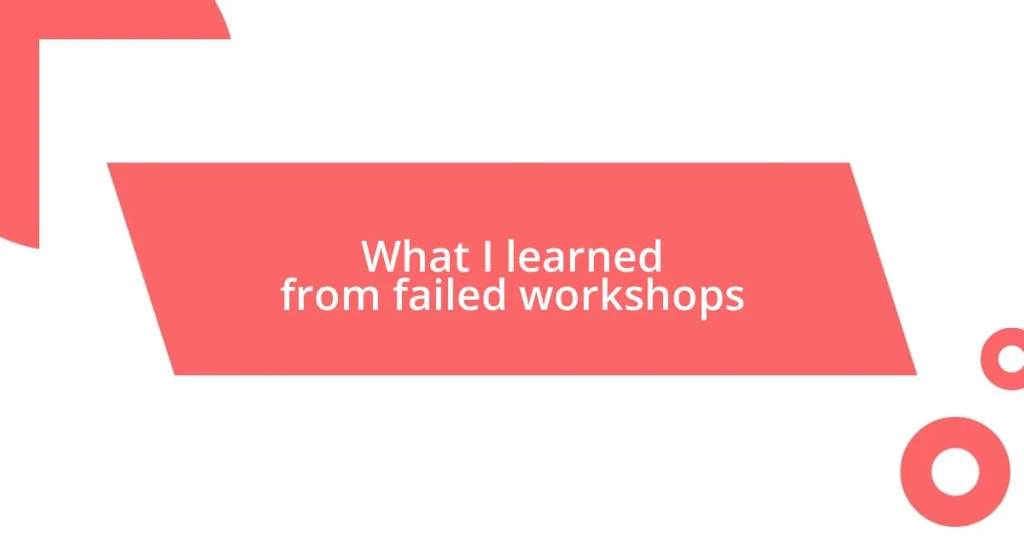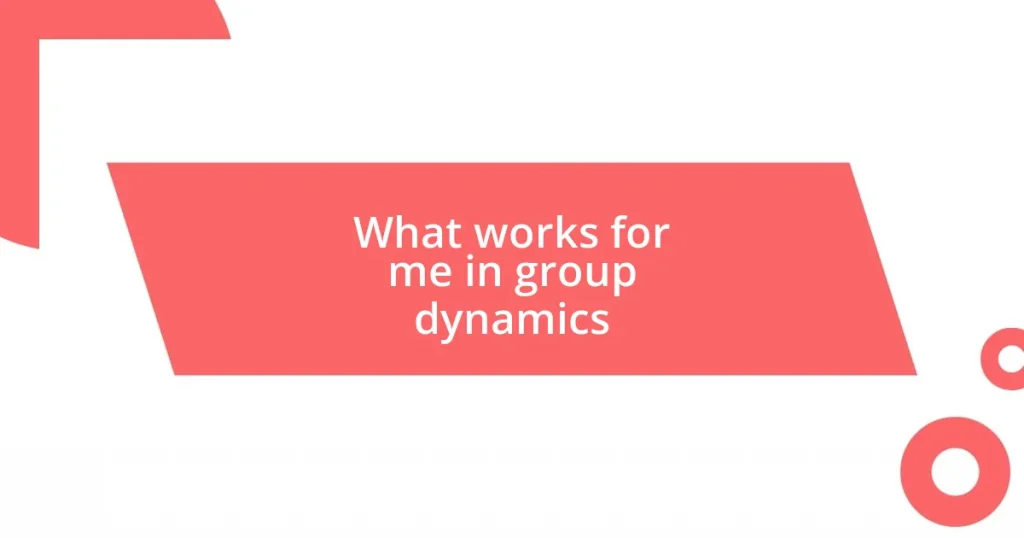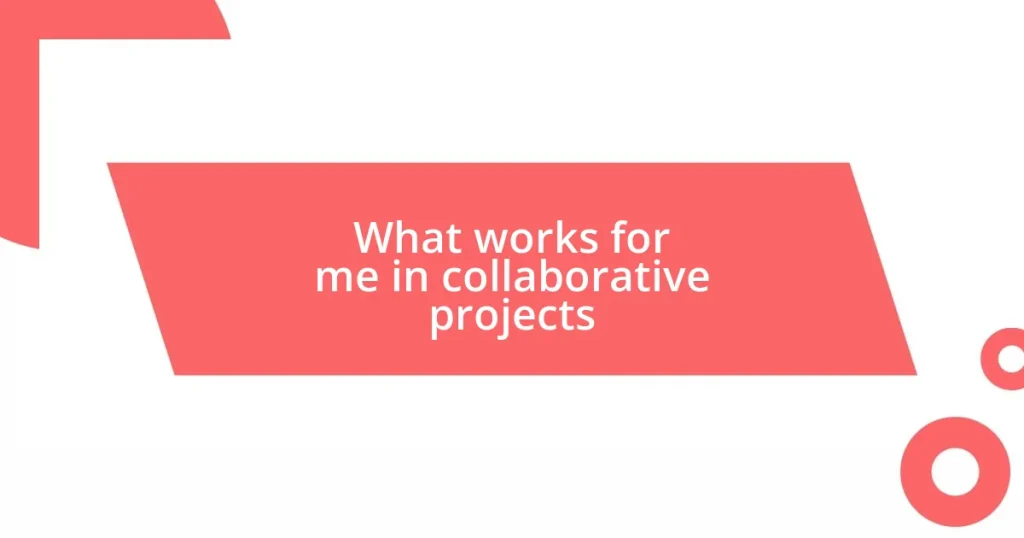Key takeaways:
- Virtual workshops enable global participation and diverse perspectives, enhancing engagement and personal growth.
- Setting clear goals before a workshop enhances focus and learning outcomes, allowing for actionable insights post-session.
- Interactive elements, such as breakout rooms and polling, significantly boost participant engagement and create a sense of community.
- Intentional networking during workshops, including follow-ups and leveraging chat features, can lead to valuable professional relationships.
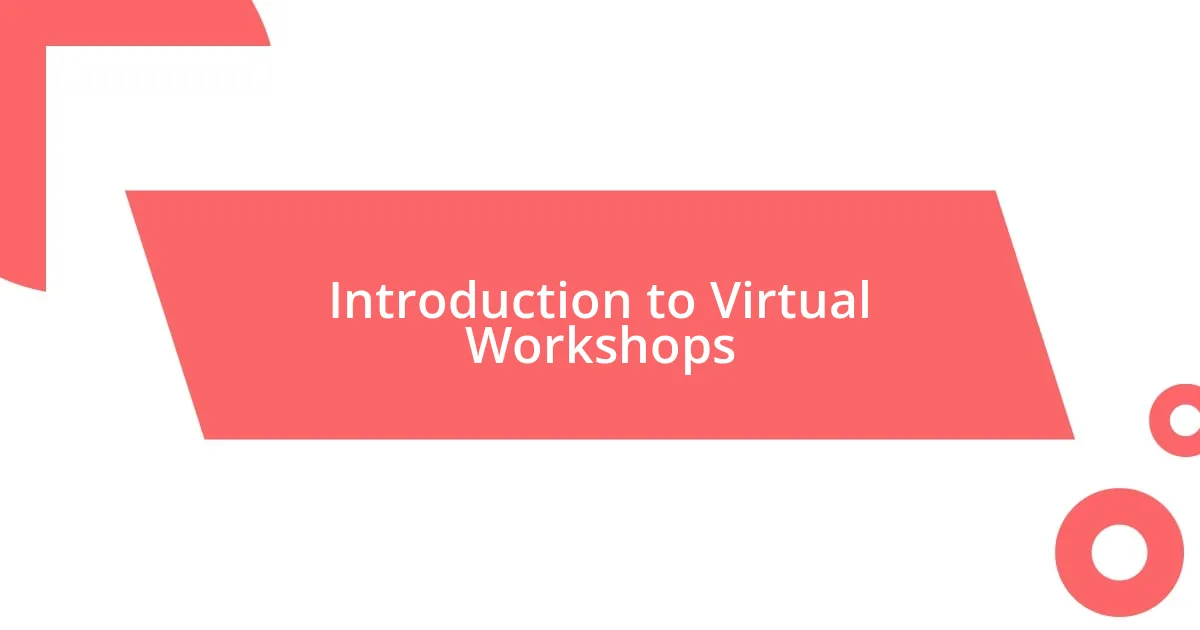
Introduction to Virtual Workshops
Virtual workshops have become an essential part of our professional landscape, especially in recent years. I still remember my first online workshop; I was skeptical about how engaging it could be. Could a screen really replicate the energy of a live session? Surprisingly, it did, and that experience opened my eyes to a new world of learning.
In these interactive settings, I find that participants can connect from anywhere in the world, bringing diverse perspectives right to my virtual doorstep. I often look forward to the vibrant discussions that unfold, fueled by this incredible mix of ideas. Have you ever thought about how much we can gain from hearing others’ experiences? It’s a reminder that, while we may be miles apart, we share common aspirations and challenges.
What truly captivates me about virtual workshops is the accessibility they offer. I once helped a colleague overcome their fear of public speaking during an online session. The joy and relief on their face when they nailed their presentation made me realize the profound impact these workshops can have. Isn’t it remarkable how technology can foster such growth, even from a distance?
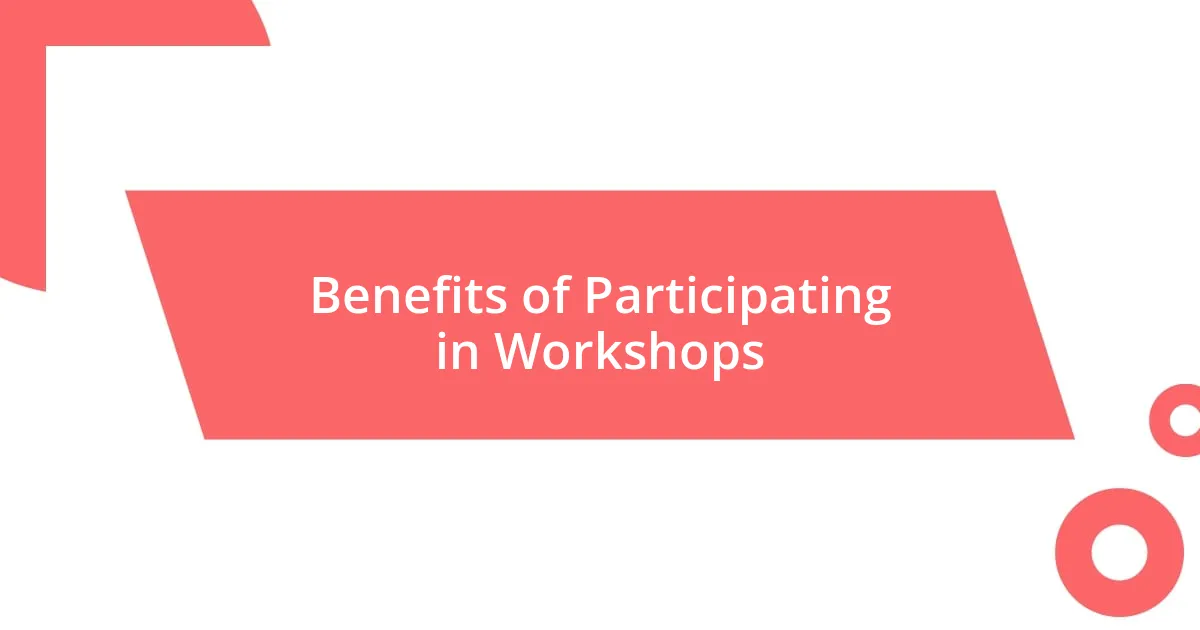
Benefits of Participating in Workshops
Participating in workshops provides a unique opportunity to enhance skills and gain knowledge in an interactive format. I’ve found that when I actively engage with facilitators and fellow participants, I not only deepen my understanding of the subject matter but also receive immediate feedback. This real-time interaction feels much more enriching than traditional learning methods, which often leave questions unanswered.
Another significant advantage is networking. During one workshop I attended, I connected with a mentor whose expertise perfectly aligned with my goals. This relationship blossomed into a long-term collaboration that has benefited my career immensely. Have you ever experienced that moment when a simple conversation opens doors you didn’t even know existed?
Lastly, workshops often incorporate practical exercises that allow participants to apply what they’ve learned immediately. I recall working on a group project that challenged us to brainstorm solutions to real-world problems we faced in our fields. The collaborative spirit sparked creativity I hadn’t tapped into before. It’s amazing how a shared goal can unite diverse minds, leading to innovative ideas!
| Benefits | Description |
|---|---|
| Skill Enhancement | Interactive learning fosters immediate feedback and deeper understanding. |
| Networking Opportunities | Connect with mentors and peers for long-term professional relationships. |
| Practical Application | Engage in exercises that translate theory into practice, enhancing creativity. |
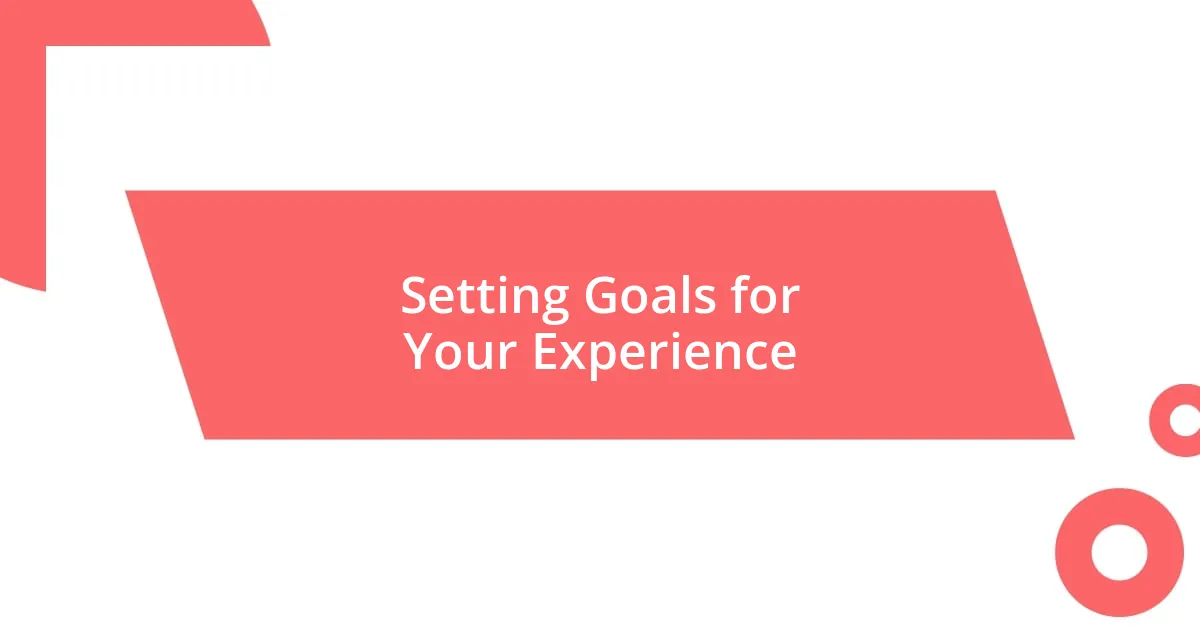
Setting Goals for Your Experience
Setting goals before attending a virtual workshop is crucial for maximizing the experience. From my perspective, having clear objectives not only keeps you focused but also enhances the overall learning process. When I clearly defined what I hoped to gain from a workshop on leadership, I found myself more engaged and proactive in discussions. I walked away with actionable insights, ultimately empowering me to implement what I learned in my daily work.
Here are some tips to consider when setting your goals:
- Identify Specific Skills: Determine skills you want to grow, like public speaking or project management.
- Establish Realistic Outcomes: Think about what you can realistically achieve within the workshop’s timeframe.
- Prepare Questions: Write down any lingering questions you have to ensure you get the most out of your interactions.
- Network Intentions: Plan to connect with specific individuals who align with your professional aspirations.
- Reflect Post-Workshop: Set aside time after the session to evaluate what you learned, helping you integrate those lessons into your routine.
When I first set goals for a workshop on digital marketing, I didn’t just want to learn; I aimed to become confident in my strategy development. This clarity helped me engage with facilitators and fellow participants in a way that felt personal and directed. Each conversation deepened my understanding and even sparked new ideas I hadn’t considered before, making the entire experience profoundly rewarding. Goals can transform the way you interact, leading not just to knowledge but to genuine connection.
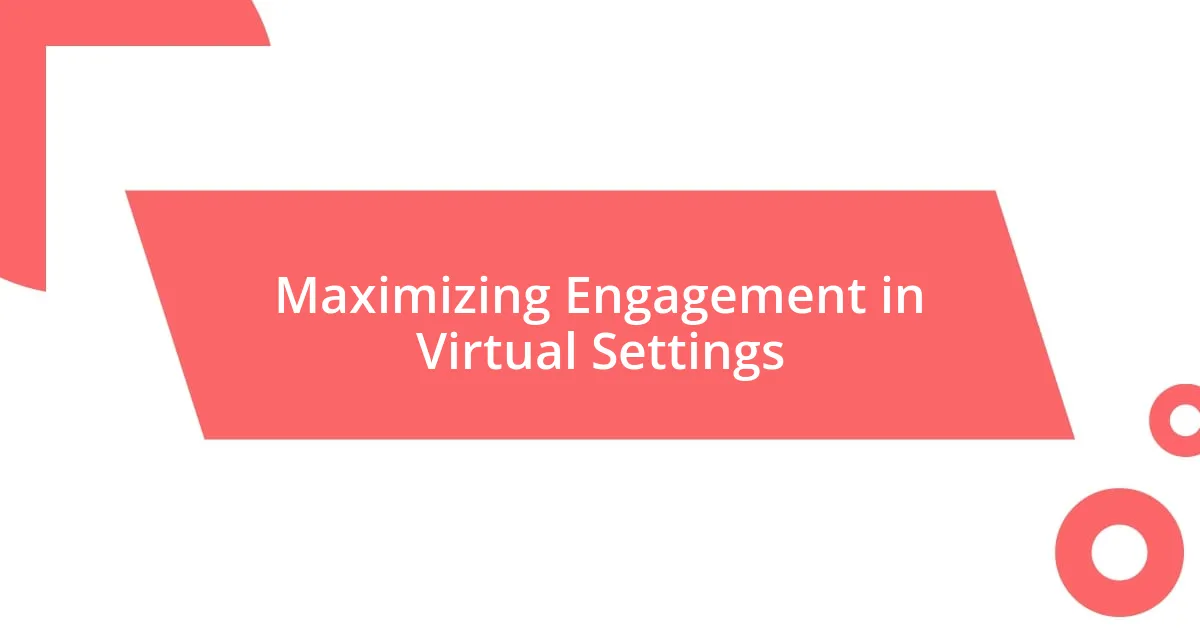
Maximizing Engagement in Virtual Settings
In my experience, incorporating interactive elements is key to maximizing engagement in virtual workshops. For instance, during a recent session on team dynamics, we broke into smaller breakout rooms to discuss case studies. This setup allowed everyone to contribute, which not only made the discussions richer but also created a sense of community—even through a screen. Does anyone else feel more comfortable sharing ideas in smaller groups? I certainly do.
Another effective strategy is utilizing tools like polls and Q&A sessions. I remember one workshop where the facilitator launched a quick poll about our biggest challenges. The instant feedback helped tailor the session to our needs, making it feel more relevant and engaging. It’s fascinating how these simple tools can transform a passive listening experience into an active and dynamic discussion.
Finally, the role of a personable facilitator can’t be understated. I once attended a workshop led by someone who shared personal stories related to the topics at hand. It was so refreshing to hear real-life experiences instead of just theoretical concepts. Their passion for the subject made it easier to connect and feel energized. Have you ever noticed how enthusiasm can be contagious? That’s a critical element in keeping a virtual audience engaged!
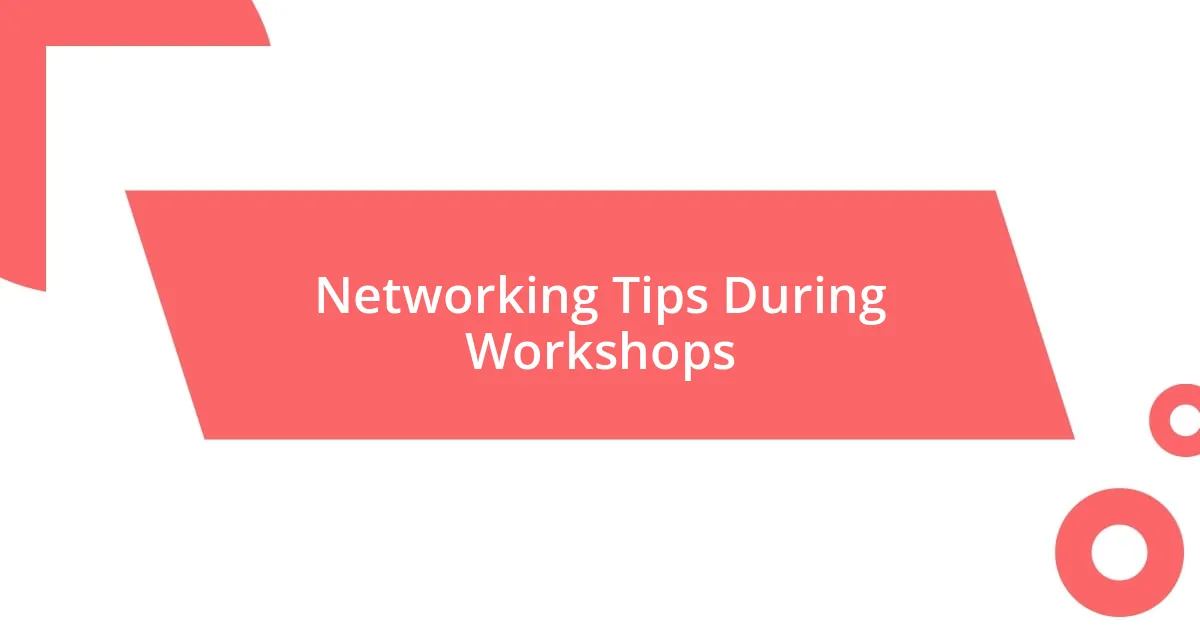
Networking Tips During Workshops
Networking during virtual workshops can be surprisingly rewarding if approached with intention. One of my favorite strategies is to leverage the chat feature actively. For instance, during a recent virtual workshop on innovation, I made it a point to send direct messages to participants whose contributions resonated with me. I found that complimenting their insights led to meaningful conversations later, turning initial impressions into valuable connections. Have you ever reached out after a session only to discover shared interests? It’s exhilarating!
Another great tip is to participate in breakout sessions whenever they’re offered. I once joined a workshop that utilized breakout rooms to discuss automation strategies, and it quickly became my favorite part. Instead of being just another face in the crowd, I got to know the participants and interact more closely. By the end of the activity, we exchanged LinkedIn profiles and even plan to collaborate on a future project. It’s such a fulfilling feeling to see how a simple group conversation can lead to ongoing professional relationships.
Don’t forget to follow up after the workshop! I can’t tell you how many times I’ve sent a quick email to new contacts, expressing gratitude for their insights and suggesting a coffee chat—virtual, of course. This simple gesture demonstrates that you value the connection. It’s fascinating how a brief note can pave the way for deeper conversations and future collaborations. So, what’s holding you back from reaching out? I promise you’ll find that most people appreciate a friendly follow-up, and it sets the foundation for something meaningful.
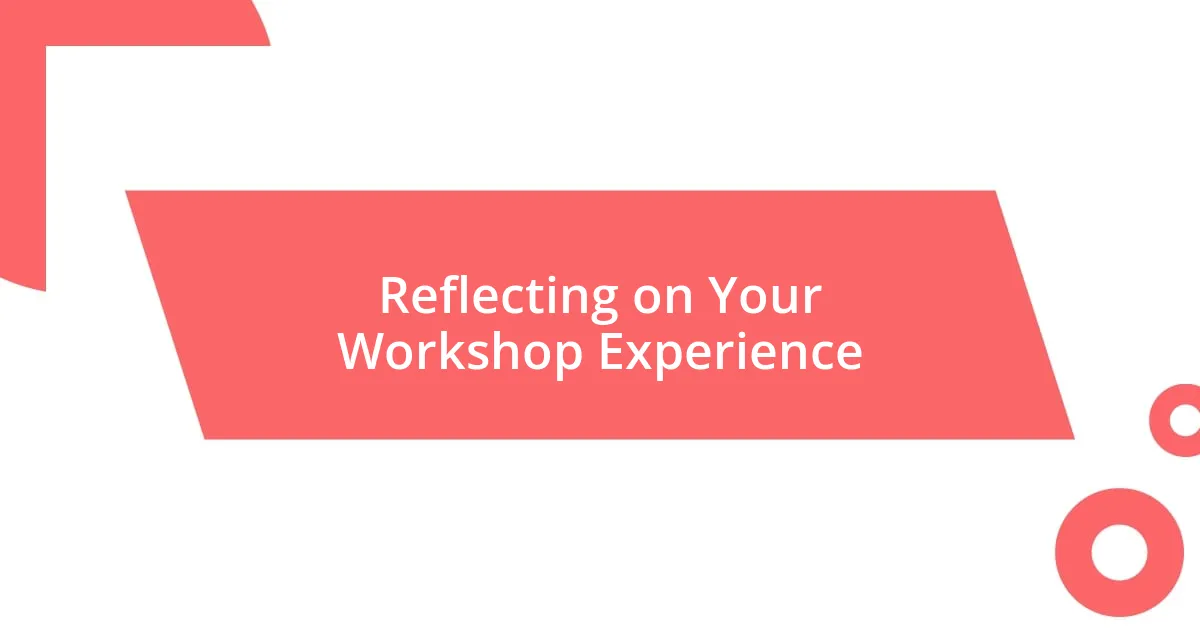
Reflecting on Your Workshop Experience
Reflecting on my experience with virtual workshops often brings a mix of emotions. I distinctly remember leaving one particularly impactful workshop feeling invigorated and inspired. The discussions had sparked new ideas within me, reminding me of the power of shared knowledge. Have you ever finished a session and felt that rush of creativity? It’s moments like these that make me appreciate the value of well-facilitated workshops.
Looking back, I recognize the importance of self-assessment after each workshop. After one event, I took a moment to jot down my thoughts on what worked and what didn’t. This practice not only helped me identify areas for improvement personally but also highlighted which aspects of the workshop resonated with me the most. I often ask myself: What did I learn that I can apply in my work or daily life? This reflection transforms a simple experience into a valuable lesson.
It’s fascinating how each workshop can change the way I approach collaborations. After attending a session focused on remote team-building strategies, I was eager to implement what I learned with my team. I shared my reflections with my colleagues, and together we crafted new ways to engage more effectively. This emphasis on growth and learning is what keeps me coming back to virtual workshops, as each experience is a stepping stone to becoming a better version of myself. Have you ever thought about how reflecting on your experiences can lead to personal development? I find it to be a powerful catalyst for change.




